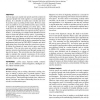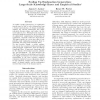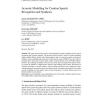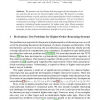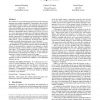1676 search results - page 234 / 336 » Formal Development of Self-organising Systems |
HT
1997
ACM
15 years 1 months ago
1997
ACM
Activity spaces are usually task-specific and only common to a group of people who work together in a certain application domain. It is desirable to enable users to define and mod...
AAAI
1996
14 years 11 months ago
1996
To explain complex phenomena, an explanation system must be able to select information from a formal representation of domain knowledge, organize the selected information into mul...
INFORMATICALT
2008
14 years 10 months ago
2008
This paper presents the Croatian context-dependent acoustic modelling used in speech recognition and in speech synthesis. The proposed acoustic model is based on context-dependent ...
TPHOL
2005
IEEE
15 years 3 months ago
2005
IEEE
Abstract. We present a set of problems that may support the development of calculi and theorem provers for classical higher-order logic. We propose to employ these test problems as...
129
click to vote
TLDI
2010
ACM
15 years 6 months ago
2010
ACM
ML modules are a powerful language mechanism for decomposing programs into reusable components. Unfortunately, they also have a reputation for being “complex” and requiring fa...
